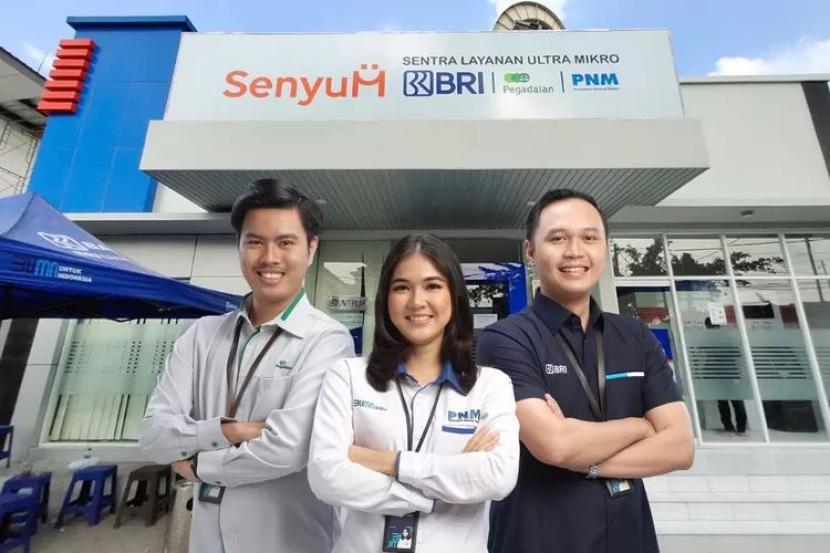REPUBLIKA.CO.ID, JAKARTA -- Deputy Minister of SOEs Kartika Wirjoatmodjo said there were three aspects to advancing MSME business and make them sustainable.
These three aspects are the accessibility with low operating costs; the capital and guarantee; and the access to competence through empowerment. According to him, these three aspects are concepts promoted by PT Bank Rakyat Indonesia (Persero) Tbk, Pegadaian, and Permodalan Nasional Madani (PNM) in the integration of Ultra Micro Holding (UMi).
To date, more than 45 million ultra-micro actors have been registered who have received benefits and have the potential to level-up. Nevertheless, a big challenge lies ahead in line with target of Indonesia Emas 2045, namely increasing the number of new workers amidst a population surge.
For this reason, Kartika considered it necessary to strengthen those three aspects by reaching out to much smaller business actors, even those that have so far been categorized as not yet eligible for credit. In the next 10 years, there may still be another 35 to 45 million to go to entrepreneurs who start at the pre-prosperous or pre-credit worthy level.
It is necessary to provide access to finance, provide business capabilities, and access to government guarantees. So the issue is that after a few years we have entered a lower layer, less bankable and smaller in size. "So it requires deeper reach, cheaper costs, and broader guarantees," said Kartika, Thursday (Jan.18, 2024).
Kartika explained in detail how to strengthen the three aspects through collaboration with Ultra Micro Holding as an entity and the government as a policy maker. Firstly, in an effort to reduce operating costs, UMi Holding can utilize agent networks such as BRI's AgenBRILink, PNM's Mekaar Group and so on in every corner of the village so that accessibility is closer, cheaper and easier than going to a branch office.
On the other hand, implementing the hybrid bank concept with digitalization will cut servicing costs which are currently more expensive than the interest and loans obtained by business actors. "People travel far to branches or units, but there are agents in front of their house. So now our transactions have been moved starting from credit disbursement, credit installment payments, all transactions at the agent," Kartika said.
Meanwhile, the function of branch offices/units will be transferred to strengthen the second aspect, namely coaching and empowering business actors. This place will be a center for courses, discussion rooms and a community center for business actors to gain competence regarding how to develop their business so that it can rise to the next level.
"It is important that people have the competence to do business properly, starting from how to package products, logistics, and managing their finances. You can't just give them money, give them guarantees, but they also need to be trained so that they know how to try and manage their cash flow properly. We are strengthening this development so that they can move up to class, from previously only borrowing 2.5 million, one day they can move up to micro, retail and even medium," he continued.
What is no less important is expanding the guarantee from the People's Business Credit (KUR) capital that has been provided by the Government. Kartika believes that banks need courage to provide KUR to beginners who are not yet bankable and even have a lot of experience. For this reason, the government is currently looking for an initial guarantee mechanism in the hope that these business actors can gradually rise to the next level.
"Our proposal to the government is that we expand and add to this guarantee so that people can enter the system with a guarantee from the government first. It doesn't have to be forever, the hope is that in two cycles, if he gets stuck, the government will provide insurance through KUR, then in the third cycle he (can) go into commercial. So, we are still defining the guarantee mechanism from ultra-micro to micro or even to retail," he added.
According to Kartika, if this effort is carried out consistently over the next decade, it has the potential to add 30-40 million business actors to the system and create 80 million jobs in the future. Holding UMi could also be an engine to massively encourage community prosperity at the rural level. The community will become increasingly prosperous in welcoming a golden Indonesia 2045. It is known that Holding UMi targets serving up to 45 million people who do not have access to formal financial services (unbankable) by 2024. The number of Holding UMi debtors also continues to increase.
As of September 2023, the number of holding debtors has reached 36.6 million or a growth of 22 percent from the position in September 2021. This means that BRI, Pegadaian and PNM will still attract 8.4 million new ultra-micro debtors until 2024. The total outstanding ultra-micro holding loans reached IDR 590.7 trillion as of the end of September 2023 or growing 11.6 percent annually. This figure has increased in value by 27.38 percent when compared to the initial period of holding formation.
In detail, BRI's micro credit contribution as the holding company reached IDR 479.9 trillion, or an increase of 10.9 percent on an annual basis with 14.2 million debtors. Meanwhile, Pegadaian's credit portion reached IDR 65.6 trillion, or an increase of 17.3 percent with a total of 7.4 million borrowers. PNM financing reached IDR 45.3 trillion, or grew 14.3 percent with 15 million debtors.


